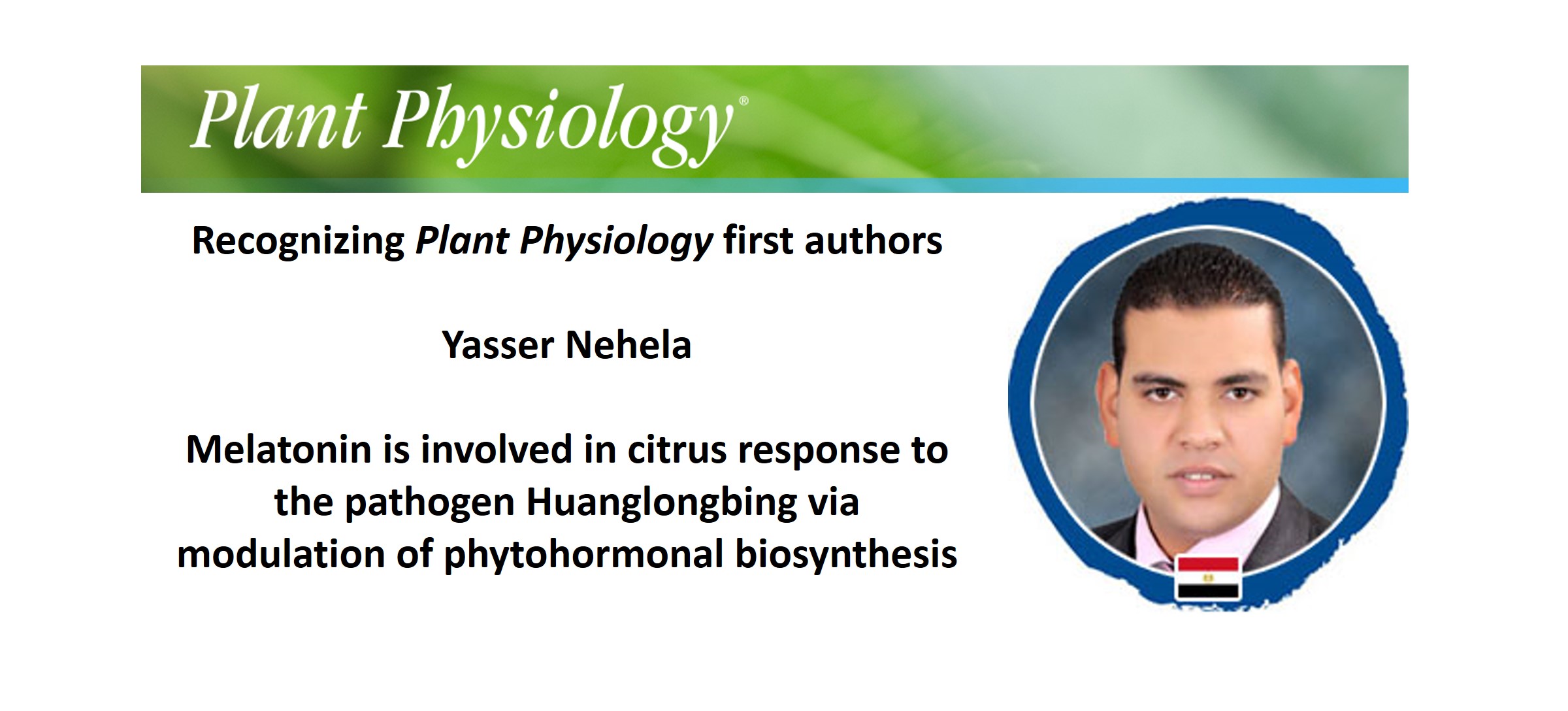Recognizing Plant Physiology authors: Yasser Nehela
 Yasser Nehela, first author of Melatonin is involved in citrus response to the pathogen Huanglongbing via modulation of phytohormonal biosynthesis
Yasser Nehela, first author of Melatonin is involved in citrus response to the pathogen Huanglongbing via modulation of phytohormonal biosynthesis
Current Position: Post-doctoral research associate, Citrus Research and Education Center and Department of Plant Pathology, University of Florida, Lake Alfred, Florida, USA
Education:
Dec. 2018: Ph.D. in Agriculture Science (Major: Plant pathology), Department of Plant Pathology, University of Florida, Gainesville, Florida, USA
- Advisor: Dr. Nabil Killiny
- Dissertation Title: “Metabolic Responses of Citrus Plants to the Bacterial Pathogen Candidatus Liberibacter asiaticus and Its Insect Vector Diaphorina citri“
Oct. 2012: M.Sc. in Agriculture Science (Major: Plant pathology), Agricultural Botany Department, Faculty of Agriculture, Tanta University, Egypt
- Advisor: Dr. Hassan El-Zahaby
- Thesis Title: “Effect of Some Agricultural Practices on Rice Blast Infection of Some Egyptian Rice Cultivars”
May 2004: B.Sc. in Agriculture Science, Faculty of Agriculture, Tanta University, Egypt
Non-scientific Interests: painting, photography, graphic design, and reading
Brief bio: I received my B.Sc. in Agricultural Sciences, with an honorary degree, in June 2004 from the Collage of Agriculture, Tanta University, Egypt. Then, I obtained my M.Sc. in Plant Pathology in October 2012 from the same institution, where I gained my experiences in lab and fieldwork particularly on rice blast disease, one of the most threatening diseases worldwide, caused by the ascomycetous fungus Magnaporthe oryzae. In 2014, I joined Dr. Nabil Killiny’s research group at Citrus Research and Education Center, University of Florida (CREC-UF), USA, as a visiting scholar to work on the citrus greening disease (aka Huanglongbing [HLB]), a destructive bacterial disease of citrus worldwide. I obtained a Ph.D. in Plant Pathology from the Department of Plant Pathology, UF, USA, in the Fall of 2018 under the supervision of Dr. Killiny. During my Ph.D., I used integrative metabolomics, transcriptomics, and bioinformatics techniques to understand the citrus response(s) against the bacterial pathogen ‘Candidatus Liberibacter asiaticus’ and its insect vector Diaphorina citri at both molecular and metabolic levels. I completed my Ph.D. program in two years and seven months.
Currently, I am working as a postdoctoral research associate at Killiny lab (host-pathogen-vector interactions lab), CREC-UF, where my research program is explicitly designed to investigate the effect of ‘Ca. L. asiaticus’ infection on melatonin, a ubiquitously distributed hormone-like compound, found in prokaryotes such as bacteria, and eukaryotes including plants, and animals. As well as, I am investigating some innovative, eco-friendly approaches to maintain the homeostasis of primary and secondary metabolism, particularly stress-associated phytohormones, to improve citrus health and enhance its resilience to biotic and abiotic challenges. After a steep learning curve, ended up publishing about twenty peer-reviewed research papers, three review articles, and co-authored several conference abstracts. Later, I plan to return back to Egypt to fulfill an appointed position as an assistant professor of plant pathology in the Department of Agricultural Botany, Faculty of Agriculture, Tanta University, where I will conduct research hoping to apply what I have learned to improve the citrus industry in Egypt.



